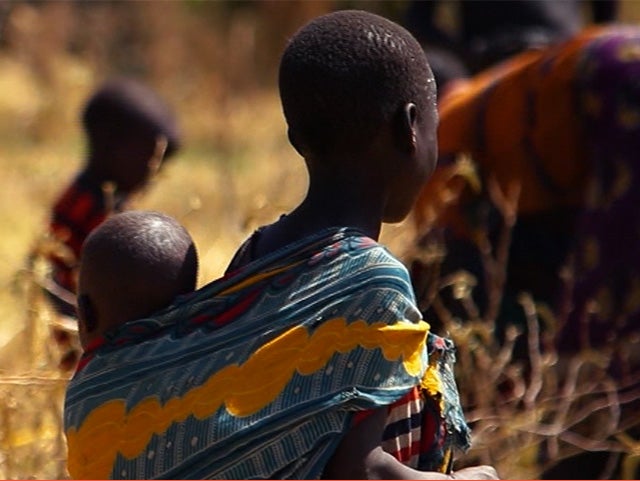New Well Promises a Brighter Future for African Village
As the sun rises over Karamoja, Uganda, the sound of singing fills the air. Young and old dance as one, while prayers of relief and gratitude are lifted to heaven. Among those celebrating is Teko, a well-respected elder in her village. Like many, she prayed for this day for a very long time.
“This is the first time I’ve ever had clean water,” Teko said. “For years I’ve been in pain from drinking dirty water. Now at last my pain is gone.”
We flew to this remote corner of Africa, crossing a wide expanse of barren landscape, and met up with Sivan Ya’ari from Innovation Africa, an Israeli ministry supported by CBN.
“I’ve been in Africa for many years, almost two decades,” Sivan said. “There is no doubt that here in Karamoja the need is much greater than any other place I’ve been.”
“There is a famine in the land, Angelina said. “Water is life. Without it we cannot do anything.”
Before the wells were drilled here, daily desperation consumed people’s lives. They did what they needed to survive, as death crept around every home. Each morning, people start fires, some clean their homes, and others harvest reeds or chop wood. But every family had one main goal for the day, finding water.
“In times of draught we go very far in search of water,” Lucia said. “The water is always dirty. My whole family has been sick because of it.”
Many are forced to share their water sources with animals.
“After chopping wood all day, I went to our spring to drink water, but cows trampled the water and it was too dirty to drink,” Angelina said. “As I walked back home I almost fainted.”
Out of options she went back to the murky pool, bent down, and drank muddy water she shared with cattle. In the peak of the dry season, sometimes there isn’t even muddy water. This region is called Nakapiripirit, which literally means, “heat waves.”
“We’ve all tried to grow crops but at times like this there is nothing we can do,” Lucia said. “The sun burns it all.”
“They don't know where to get water, there is no water to be found,” Sivan said. “And if the mothers are able to find some water most of the time it's so contaminated, and they know that most likely it will make their kids sick, many of them are praying that their children will not die from thirst or the contaminated water, but they have no choice.”
“I remember walking an entire day in search of water,” Teko said. “I spent hours digging without finding any. I was very weak and it took me 8 hours to get home. I saw someone with a little bit of water and whispered ‘Please help me. I am thirsty.’ But her children had already finished it. I fell down exhausted. My throat was too dry to speak, so I whispered a prayer to God for water.”
When the crops fail and they have nothing to eat, people pick tree leaves.
“This is what they subsist on. It hardly has any nutritional value and doesn’t taste like much of anything, just sort of bitter. Most of the time they’ll boil it in salt and muddy water and Teko tells me that when there’s no water at all they’ll boil this in cow urine.”
“Instead of coming home empty handed, we bring the cow urine,” Teko said. “You drink it or use it for preparing food. After drinking it you feel like vomiting, but when you vomit nothing comes out, because you are starving.”
Many people suffer from a condition called Brucella, from eating contaminated food.
“One of my children lost all of his hair, and had open sores on his head. I knew it was because of the urine and dirty water,” Teko said.
“I don't think people are realizing how harsh is it for so many people,” Sivan said. “The starvation is forcing people to eat leaves, mice, drinking the blood of their animals just to survive.”
“In times of famine, we drain some blood from a cow, and drink it to survive,” Teko said. “We don’t normally do that but when there is nothing else we have to.”
The cows don’t die from the bloodletting, and they’re not killed for their meat. They’re kept, so drinking blood can always be a last resort for survival.
Not one family has been left untouched by the lack of water. Many, including Lucia, have dealt with death. “I remember when I was pregnant. I was carrying water home from the contaminated stream. I had been sick for days from drinking that water. A terrible pain tore at my insides, and I realized I was having a miscarriage. I thought I was dying. I got very cold, and every part of my body ached. It felt like my life was over. I know it happened because of the water.”
Sivan saw firsthand what can happen to the elderly in times of drought and famine.
“An old women is about to die of hunger,” said Charles.
“I don’t understand, what?” Sivan asked.
“An old women, helpless, she’s about to die of hunger,” Charles said. “There’s no food.”
“I’ve been in Africa for many years and when I arrived I couldn’t believe it,” Sivan said. “When I went to the first village I saw elders that are dying from hunger, I felt hopeless at that point. It’s much worse that what I thought. I’ve never seen anything like it. In the past few days 37 we have heard of 37 people who have died of thirst.”
“There was an old lady that died in her house,” Teko said. “She was as thin as a reed. She was dead for three days before anyone found her. She was so dried up, we didn’t even smell her body.”
During these times only the strong can bare it. Elders and young children suffer the most.
“It pains me to see my grandchildren thirsty and going hungry,” Teko said. “Sometimes they are too weak to get up. I give my food to the children. Then I kneel down, make the sign of the cross, and God comes and takes my hunger away.”
“As a mother of 3 children it is heartbreaking when I see the children suffering,” Sivan said, “but even worse is when I look at the mothers and how they are hopeless because they don't know how to save their children.”
“I went on my knees and said ‘God you are the one who gave me these children. Why have you given them to me only to take them away? There is no one who can help us apart from You,’” Teko said.
Then one morning, Teko and the others heard a sound almost like thunder outside their village. Two large trucks arrived. As they started drilling the news spread quickly. Their lack of water would soon be a thing of the past. CBN teamed up with Innovation Africa and drilled not one, but 4 wells in this region. When water erupted for the first time, animals from far away sensed it, and walked miles to drink. Children played, and people gathered from a dozen villages. More than 10,000 people now have fresh, clean water.
“It’s the right time for us to be here,” Sivan said. “It seems like they’ve been waiting for us, they keep saying that they knew we will be coming, because they were praying God and they knew we will be coming and they will be saved.”
“This is the first time in 30 years that I don't have to search for water,” said Teko Nakuro. “I cannot believe it. Just as God rescued Daniel from the lion's den, He has rescued us today.”
With the drilling complete, we built towers and hoisted tanks to store the water. Through the use of Israeli technology, solar panels provide the energy needed to power deep well pumps.
“The same sun that is making them thirsty, that is drying their land, is today the same sun that is providing them with water,” Sivan said. “It's the energy from the sun that is now saving people's lives.”
“As the solar panels are being installed back here all of the women of the village have turned out to sing songs thanking the people of Israel and praising God for bringing water to a place where it was desperately needed.”
In fact, this barren corner of Africa almost became the New Jerusalem.
“In 1903 the land of Karamoja was offered to the homeless Jews from Europe,” Sivan said. “This could have been the homeland of the Jews.”
Today more than one hundred years later, CBN and Innovation Africa have come to share the same Israeli technology that’s transforming the dry deserts of Israel into fertile farmland.
“I believe that Israel is nothing short of a miracle, when you think about all the innovations that are coming out of this small country,” Sivan said. “As Israeli's we feel a sense of pride to come to Karamoja now that we are strong, to be able to share the blessings out of Israel. It’s emotional for us to have this opportunity especially with CBN to come together as Christians and Jews and to be able to help. Without us coming together here thousands of people would have died, absolutely no doubt about it.”
“I cannot believe it,” Teko said. “My grandchildren are really enjoying the water, now they can drink water whenever they want.
“I love drinking the water, it tastes so good,” said Aleper.
“It is priceless when we see the joy in the eyes of the mothers, the hope when water is flowing,” Sivan said. “It’s worth everything. And I wish the donors could see it and understand the impact they are making in the lives of so many people.”
We gave all of the families here seeds to start new gardens. We’re also giving them food to help them get by, as their crops begin to grow lush and strong.
“Just as God has blessed the water, He will bless the seeds you have brought,” Teko said.
The towers and tanks provide enough pressure to pipe water a mile or more to nearby villages. People gladly work together to dig trenches and lay pipes so their villages can have water, too.
With fresh clean water, sicknesses has drastically decreased. Lucia and her family even welcomed a healthy baby boy into the world.
“Having water has changed our lives,” Lucia said. “Everything is better. We can finally grow our own vegetables, and even sell them at the market.”
“Once they have access to water everything changes,” Sivan said. “People can wash themselves, they're no longer thirsty, they grow, food, children can go to school, people are healthier.”
“It is so wonderful being clean,” Teko said. “Before, we only washed during the rainy season. Once the season ended, we stayed dirty, sometimes for nine months. Now I bathe every day. I am so grateful.”
Just hours after the first taps were opened, people did laundry, clean clothes waved in the wind, cook pots boiled, and streams of people gathered water to take home.
“I know that God has answered our prayers,” Teko said. “The grandchildren of my children will not suffer like we have suffered.”
“What we are doing here is not only for now, but it’s for many generations to come,” Sivan said. “It’s the beginning of a better future for centuries.”
“Thank you for bringing us water, I love you all very much!” Aleper said.
“God is so great! He has answered our prayers through the people of Israel and CBN. Thank you, may God bless you all!”




